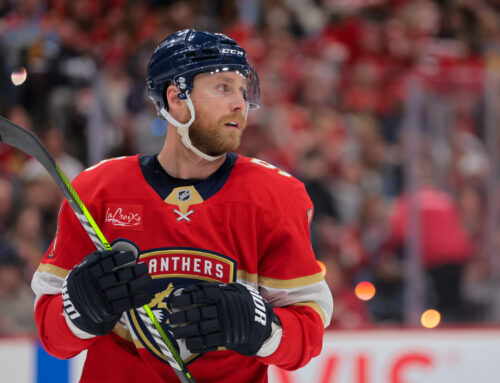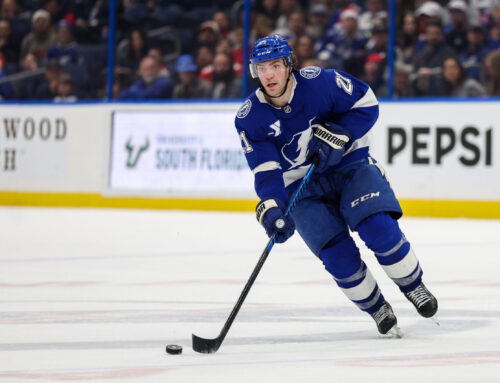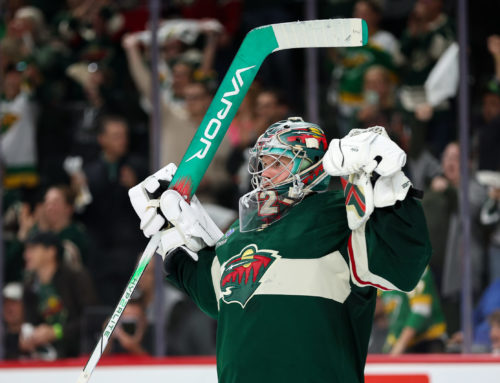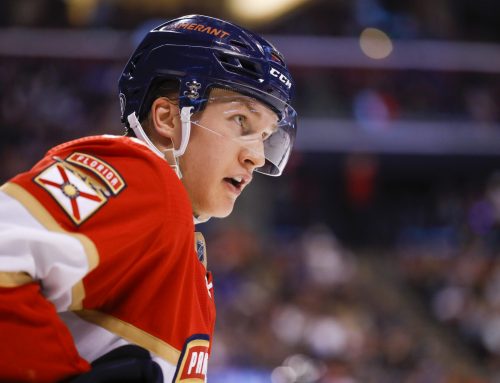
Who is the better fantasy hockey own – Drew Doughty or Justin Faulk? Not so fast – the answer may surprise…
This week’s match – our third defensemen battle of 2016 – has high stakes, pitting Drew Doughty against Justin Faulk. Is Doughty having a sustainable offensive rebirth this season? Is the real Justin Faulk the player from his first 36 games this season (30 points), or from his next 18 (four points), or somewhere in between? Time to find out – Cage Match starts now!
Career Path and Contract Status/Cap Implications
Doughty, still only 26, was the second overall pick in 2008, and showed he was worthy by posting 59 points in 2009-10. But it took him 116 more games to then post his next 59 points. Whispers suggested his “real life” hockey importance might be surpassing his fantasy value, especially after only tallying another 59 points in 126 games over 2012-13 and 2013-14. But last season saw an uptick in production (46 points in 82 games), marking only the second time he bested the 40 point mark. And in 2015-16, he’s at a 52 point full season scoring pace through 58 games.
Faulk, who turns 24 next month, wasn’t nearly the hyped prospect as Doughty, going 37th overall in the 2010 draft. But after an excellent college campaign, he earned his NHL debut before turning 20, playing 66 contests and posting 22 points. Although Faulk only played 38 of 48 Hurricane games in 2012-13, he upped his scoring pace (15 points) considerably. After 32 points in 76 games in 2013-14, his production surged to 49 points last season; and for 2015-16 so far, his scoring pace is almost identical to Doughty’s.
Per Cap Friendly, Doughty’s current deal expires in 2018-19 and counts $7M against the cap per season, while Faulk is inked through 2019-20 on a deal that comes with a cap hit of $4.833M each year.
Ice Time
|
Season |
Total Ice Time per game (rank among team’s defensemen) |
PP Ice Time per game (rank among team’s defensemen) |
SH Ice Time per game (rank among team’s defensemen |
|
2015-16 |
28:16 (D.D.) – 1st 24:38 (J.F.) – 1st |
3:03 (D.D.) – 1st 3:22 (J.F.) – 1st |
3:05 (D.D.) – 1st 2:05 (J.F.) – 2nd |
|
2014-15 |
28:59 (D.D.) – 1st 24:25 (J.F.) – 1st |
3:26 (D.D.) – 1st 2:42 (J.F.) – 1st |
2:38 (D.D.) – 1st 1:59 (J.F.) – 2nd |
|
2013-14 |
25:42 (D.D.) – 1st 23:24 (J.F.) – 2nd |
3:53 (D.D.) – 1st 2:07 (J.F.) – 4th |
2:35 (D.D.) – 1st 2:25 (J.F.) – 2nd |
|
2012-13 |
26:23 (D.D.) – 1st 24:00 (J.F.) – 1st |
3:03 (D.D.) – 1st 2:38 (J.F.) – 3rd |
2:09 (D.D.) – 3rd (tied) 2:59 (J.F.) – 1st |
Doughty is a minute-eater extraordinaire, which, for poolies, is a good thing in that he receives tons of EV and PP Ice Time, but also a bad thing, since with that also comes significant SH Ice Time. In fact, his SH Ice Time has risen each of the past three seasons while his PP Ice Time has dropped each of the past two, which is counterintuitive given his rising production over the past two seasons. Doughty’s PP and SH Ice Times this season are now essentially equal; that’s a night and day difference compared to his 59 point 2009-10 season, when he had more than double the per game PP Ice Time versus SH Ice Time (4:25 vs. 2:01)! Looking at goals per game rates for LA as a team, Doughty’s recent production gains in 2014-15 and 2015-16 seem even more counterintuitive. After all, this season, that rate stands at 2.67, which is less than 2012-13 (2.73), while last season it was 2.40, versus 2.41 in 2013-14.
On the other hand, Faulk’s Ice Times make sense in relation to his year-to-year production. Although he’s receiving only 1:14 more Total Ice Time versus 2013-14 (when he posted 33 points), all of that added Ice Time has come on the PP, while at the same time his SH Ice Time is down to barely 2:00 per game, which is right near what Doughty was receiving in 2009-10. That type of Ice Time change would be expected to lead to a boost in production, so seeing how that has indeed occurred, it helps validate Faulk’s breakout.
At first glance, Faulk’s situation also seemingly doesn’t jibe with his team’s scoring, what with Carolina’s goals per game rate being higher in 2012-13 (2.65) and 2013-14 (2.50), when Faulk wasn’t producing as well, versus 2014-15 (2.23) and 2015-16 (2.47), when Faulk’s scoring has gone way up. But this could realistically be a case of Faulk carrying more of the load, whereas that kind of explanation would not make sense with the up and down year to year totals for Doughty and LA that seemingly have no logical correspondence. We should get a clearer picture of this from Faulk’s PPP per game, plus his luck metrics.
Secondary Categories
|
Season |
PIM (per game) |
Hits (per game) |
Blocked Shots (per game) |
Shots (per game) |
PP Points (per game) |
|
2015-16 |
0.72 (D.D.) 0.50 (J.F.) |
1.57 (D.D.) 1.85 (J.F.) |
1.24 (D.D.) 1.02 (J.F.) |
2.36 (D.D.) 3.02 (J.F.) |
0.31 (D.D.) 0.29 (J.F.) |
|
2014-15 |
0.68 (D.D.) 0.36 (J.F.) |
1.85 (D.D.) 1.91 (J.F.) |
1.75 (D.D.) 1.39 (J.F.) |
2.67 (D.D.) 2.90 (J.F.) |
0.20 (D.D.) 0.24 (J.F.) |
|
2013-14 |
0.82 (D.D.) 0.48 (J.F.) |
2.30 (D.D.) 1.23 (J.F.) |
1.16 (D.D.)
📢 advertisement:
1.34 (J.F.) |
2.27 (D.D.) 2.00 (J.F.) |
0.20 (D.D.) 0.10 (J.F.) |
|
2012-13 |
0.75 (D.D.) 0.39 (J.F.) |
2.66 (D.D.) 1.65 (J.F.) |
0.96 (D.D.) 1.23 (J.F.) |
2.37 (D.D.) 2.00 (J.F.) |
0.21 (D.D.) 0.08 (J.F.) |
The dots keep connecting for Faulk, as his PPP per game last season was triple what it was in 2012-13, and this season is on pace to triple his 2013-14 rate. Looking at Carolina’s PP conversion %, we see it was in the bottom three of the NHL in 2012-13 and 2013-14, then rose to 15th in 2014-15; but this season it’s back down in the bottom third of the NHL. What does this mean? As long as Faulk’s 5×4 IPP isn’t much higher this season versus last season, the data paints a picture of Faulk having come into his own starting in 2014-15, and producing better as his PP Ice Time rose, helping his team somewhat along the way. What also lends credence to Faulk’s upped production is his Shots per game rate jumping nearly 50% in 2014-15 from what it was in 2012-13 and 2013-14, and inching upward even more this season.
Meanwhile, Doughty’s PP scoring was steady at one per every five games for three straight seasons, collectively totaling over 200 games. So to see it spike to nearly one per every three games this season, especially with his PP Ice Time per game being lower than in any of the past three seasons, screams unsustainable good luck. We’ll check below.
In terms of the other categories, Doughty’s PIM, Shots and Blocked Shots have essentially held steady, but his Hits have cratered – falling for the third straight season to now stand at 1.09 less per game than what he averaged in 2012-13. I noted Faulk’s Shots already; and like Doughty, he’s been fairly steady in both PIM and Blocked Shots. But interestingly, as Faulk’s production has increased, so too have his Hits, with his per game rates this season and last eclipsing what he produced in 2012-13 and 2013-14. That’s a nice win-win for GMs who own Faulk in multi-cat leagues.
Luck-Based Metrics
|
Season |
PDO/SPSV (5×5) |
Offensive Zone Starting % (5×5) |
IPP (5×5) |
IPP (5×4) |
|
2015-16 |
1013 (D.D.) 968 (J.F.) |
53.3% (D.D.) 51.8% (J.F.) |
29.3% (D.D.) 38.2% (J.F.) |
85.0% (D.D.) 81.2% (J.F.) |
|
2014-15 |
985 (D.D.) 963 (J.F.) |
52.9% (D.D.) 52.0% (J.F.) |
39.1% (D.D.) 44.4% (J.F.) |
53.6% (D.D.) 77.3% (J.F.) |
|
2013-14 |
1008 (D.D.) 988 (J.F.) |
54.9% (D.D.) 51.5% (J.F.) |
24.1% (D.D.) 35.1% (J.F.) |
46.2% (D.D.) 43.8% (J.F.) |
|
2012-13 |
985 (D.D.) 1009 (J.F.) |
54.9% (D.D.) 45.5% (J.F.) |
22.9% (D.D.) 29.6% (J.F.) |
53.3% (D.D.) 14.3% (J.F.) |
Sure enough, although Faulk’s 5×4 IPP this season is very high, it was comparable last season, essentially making both legitimate. We also see that Faulk’s OZ% has been very steady in all four campaigns, and his PDO/SPSV actually has been lower this season and last versus 2012-13 and 2013-14, suggesting that if (when?) Carolina improves as a team, Faulk’s scoring would have realistic room to benefit due to a rising tide raising all boats.
The news is not good for Doughty, however, as we see a huge spike in his 5×4 IPP this season, versus a very consistent percentage in the prior three seasons. While it is true that the Kings are tied for 4th in PP conversion percentage this season, they were 10th last season and 7th in 2012-13, so this is not something entirely new for them. In short, Doughty’s PP scoring rate is not sustainable; and had his 5×4 IPP for this season been the average (51.0%) of his past three campaigns, it would’ve meant seven fewer points this season, dropping his scoring pace to a much more familiar 42 points.
Beyond that – Doughty’s 5×5 IPP for 2015-16 is higher than all but last season, so it’s not like he’s been shortchanged at even strength to balance out his unsustainably high PP production. The takeaway is that Doughty is simply not a 50 point producer; and even in a realistically perfect world, he would get only 45 or so points, like last season.
Who Wins?
Justin Faulk is the winner. Simply put – in all my years doing Cage Match, I’m not sure I’ve seen so many clear signs that lend legitimacy to a player’s big breakout. Faulk should be a lock to score 50+ points for many seasons to come, with a chance at 55+ if Carolina starts to do better offensively as a team.
Contrast this to Doughty, who’s only above a 50 point pace this season due to unsustainably high PP production. Looking at the big picture, last season’s 46 points in 82 games is probably about as close to Doughty’s best output as one should hope for, with 40-45 points per season being more realistic for future seasons.
This Cage Match has essentially proven that Drew Doughty is the Jonathan Toews of defenseman. By that I mean he’d be one of the first defensemen an actual NHL GM would want on their team, yet it’s exactly that kind of “real world” excellence and reputation which wrongly influences poolies, causing Doughty –like Toews – to be seen as being more fantasy-worthy than he actually is. Need proof? Doughty is owned in 99% of Yahoo leagues, which is higher than seven of the 11 d-men who had more points than him through February 20th, and well above Faulk’s 93%. The same is true for Toews, who, despite not even sitting in the top 40 in forward scoring through February 20th, was one of only 12 forward-only eligible players owned in 100% of Yahoo leagues as of that date.
If you are in a keeper league, now might be the ideal time to move Doughty, especially if your team is rebuilding. After all, when you combine his reputation with the fact that he’s producing so well at the moment, you should be able to get an excellent return. Trading him a one-year league also would make sense, since he’s all but assured to score at a lower pace between now and game 82.
As for Faulk, we saw here that his metrics are sound, and he’s every bit a 50+ point defenseman. That’s fantasy gold, since only three d-men (Erik Karlsson, P.K. Subban, and Keith Yandle) hit the 50 point mark in each of the past two seasons. From what we saw here, if we made a note to look at data after the end of 2017-18, it’s likely Faulk will be on his third straight season of 50+ points, health permitting. If you can get him for a lower cost, grab him now, especially since his GMs will be keenly aware that Faulk has slumped since the calendar turned to 2016 and he’s missed a few recent games due to injury.





 MTL
MTL
 PIT
PIT FLA
FLA S.J
S.J CGY
CGY MIN
MIN
